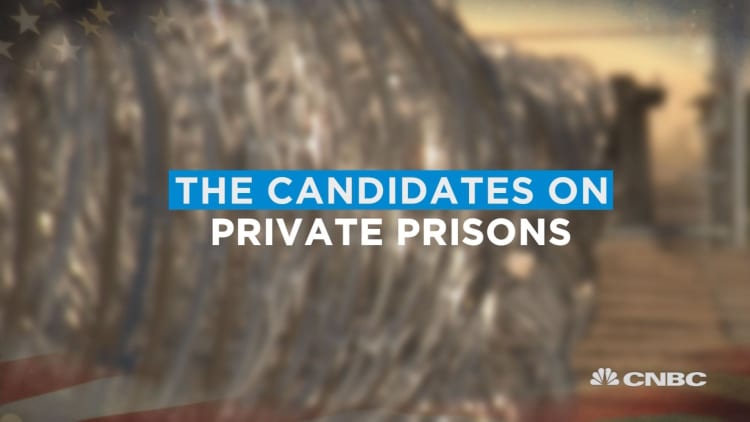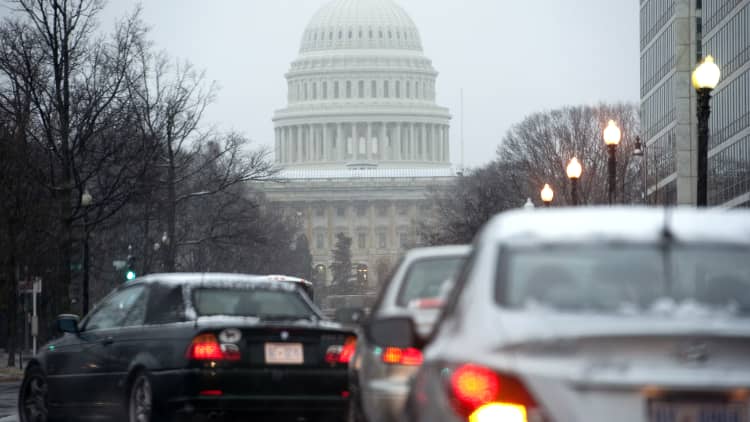


After seven years of promises, President Barack Obama again vowed last week to close Guantanamo Bay, but for Hillary Clinton, if elected president, another prison-closure issue may loom larger — and be as tough to solve: the growth of for-profit privately run prisons across the United States.
The for-profit prison industry is estimated at as much as $7 billion to $8 billion, and both Hillary Clinton and Sen. Bernie Sanders, D-Vt., have spoken forcefully — Sanders even more so than Clinton — about a desire to phase out private prisons as part of the U.S. criminal system.
"In my view, corporations should not be allowed to make a profit by building more jails and keeping more Americans behind bars," Sanders recently said. "Criminal justice and public safety are, without a doubt, the responsibility of the citizens of our country, not private corporations, and they should be carried out by those who answer to voters, not those who answer to investors."
On the campaign trail, Clinton said that "we should end private prisons and private detention centers."
But it's tough talk that could prove difficult to enact as presidential policy, involving issues of federalism, since many of the private prisons around the country are under state and local contracts, and legislative efforts to change current laws that would be opposed by the status quo support for private prisons.
The for-profit prison industries and publicly-traded companies, such as GEO Group and Corrections Corporation of America, have grown in recent decades as a result of a ballooning prison population.
The federal government, under former Attorney General Eric Holder, began a policy of reducing the total number of inmates in federal facilities. According to the Bureau of Justice Statistics, in 2014 more than 131,000 inmates were held in private prison facilities, a decrease of 2,100 prisoners from 2013. But BJS says seven states housed at least 20 percent of their inmate population in private facilities at the end of 2014, including New Mexico, Montana, Oklahoma and Hawaii. And since BJS first started tracking these statistics, the size of the private prison population has grown 90 percent from 1999–2014. (Updated data through 2015 will be released this summer.)
The big houses
CCA is the largest private prison operator, with a market cap of about $3.6 billion.
Geo Group, with a market cap above $2 billion, is the second-largest private prison player.
Non-profit In the Public Interest has estimated that these two companies represent roughly 75 percent of the private prison industry.
CCA's prison mix is 51 percent federal, including Immigration and Customs Enforcement, Bureau of Prisons and U.S. Marshalls' facilities. The remaining 49 percent is state and other municipalities (e.g. county prisons).
GEO operates approximately 170 locations, including correctional, detention, community reentry, youth treatment and day reporting facilities. Of those, 38 sites are contracted with federal agencies, and the balance are contracted with state and local agencies as well as seven international locations.
GEO had revenue of $1.8 billion last year, slightly higher than 2014.
CCA had revenue of $1.79 billion in 2015 vs. $1.65 billion in 2014.
The only current presidential candidate in either party to receive a contribution from Geo Group in the 2014 election cycle was Sen. Marco Rubio, R-Fla., who received a little more than $12,000.
A GEO Group spokesman said the company cannot comment on specific contributions or beyond the public filings made with the Federal Elections Commission, but added, "The GEO Group participates in the political process as do other organizations, including corporations and organized labor. As a matter of long-standing policy, our company does not take a position on, or advocate for or against, any specific criminal justice or immigration policy."
A CCA spokesman said its political action committee has not contributed to any of the presidential candidates, nor has the company taken a position on any of the individuals running. No outside lobbyist has donated to any presidential campaign on CCA's behalf, either, the spokesman said.
On the campaign trail, Rubio has said private prisons are a state issue.
"States are making a decision about how can we best house prisoners given the constraints of our budget, and in some instances, they have found that a private company can do it better than the public sector is doing, and others found that they can't and don't, and it really just depends on a state-by-state basis," Rubio said.
Gov. John Kasich's spokesman, Joe Andrews, told CNBC that in the Ohio governor's first year, the state sold and privatized a prison, outsourced operations and merged two facilities that were adjacently located. "We did this as part of a plan to drive down costs to taxpayers and ensure that Ohio could meet its fiscal responsibilities after inheriting an $8 billion shortfall," Andrews said.
Jack Donson, a former Bureau of Prisons official who now runs a private consulting firm, said he doesn't believe either Clinton or Sanders could do much, if anything, to reverse the private prison trend. "Absolutely nothing. These are contracts that conform to current federal law, so the law would need to be changed." Donson said. "It's lip service. It would take years to pass legislation to prohibit privatization. All the while, contracts would be being renewed under the current legal framework. Disingenuous to say the least in my humble opinion. Way too much lobby money behind the status quo."
He added, "If they were sincere about reform, they would advocate for things they can do under the existing framework and law, but that is not as sexy as playing to the base."
It would take years to pass legislation to prohibit privatization. ... If they were sincere about reform, they would advocate for things they can do under the existing framework and law, but that is not as sexy as playing to the base.Jack Donsona former Bureau of Prisons official and prison consultant
Others say that at least in the case of federal prison facilities, Clinton or Sanders could accomplish their goals.
Roughly 10 percent of inmates are held in federal facilities for federal crimes (mostly immigration-related), and the president could end those by executive order, said Brian Wolf, associate professor of Criminology at the University of Idaho.
Wolf said either Clinton or Sanders could also encourage Congress to enact legislation to end federal private prisons. However, most of the inmates held in private prisons are from states, so there is not much the federal government could do to directly abolish private prisons.
Federal money does flow to state criminal justice systems in the form of grants, Wolf said, and the 1994 Crime Bill, which both Clinton and Sanders supported, is an example of this. Prohibitions on using federal money for private prisons at the state level could be attached to those grants, but that does not mean states won't fund private prisons from state tax dollars.
"The president could work to sway public opinion on the matter if he or she wanted to make it a key issue, but the change will probably have to happen on the state level," Wolf said. He added, "Privatizing prisons is not like privatizing concession stands at a state park."
Tim Lynch, director of the Project on Criminal Justice, said prisons are overwhelmingly administered by state and local governments, so at most, Clinton could propose that Congress attach riders to "aid to the states" appropriations measures, which would essentially say, 'Take this money and you agree to stop contracting with private prisons.'"
The Clinton campaign did not respond to a request for comment.
A Sanders campaign spokesman said private prisons and detention quotas create an incentive for corporations and law enforcement to put people behind bars, and Sanders believes that eliminating this perverse incentive by ending private prisons is the first step toward reducing the U.S. prison population. Sanders also believes the nation should end mandatory minimums, reinstate the federal system of parole, and invest in jobs and education to prevent people from entering the criminal justice system in the first place.
The Sanders spokesman said the senator has focused on ending private prisons at the federal and state level through legislation and has introduced legislation covering these reforms.
Paul Ashton, development and finance manager for JusticePolicy.org, said of Sanders' legislative effort, "I don't believe it ever made it out of committee."
Donald Cohen, executive director of the nonprofit organization In the Public Interest, which is against privatization, said whoever is president can close federally-owned facilities that are operated by private companies as soon as legally possible, and convert them to public operation.
Democratic strategist Julian Epstein said the Bureau of Prisons would probably need to expand or acquire more space, but federal prisons are no longer as overcrowded a trajectory as they once were, due to changes in drug policy. "It can certainly be accomplished, but given the large number of people involved, it would be logistically complex in early phases. Clinton would probably have to phase in the plan over three to five years," Epstein said.
Passing judgment
John Wooldredge, a criminal justice professor at the University of Cincinnati, said the federal policy under President Obama of placing illegal immigrants in prisons has been a boon to the private prison and criticism of that policy could lead to a decline in private prison populations. Wooldredge added, "They would eventually fill back up, however, because the industry would simply redefine itself by selling its services for the confinement of yet another 'offender' group." He added that many of these facilities flip from "private" to "public" from time to time, so it's not like they would literally be abandoned or torn down.
"The use of private prisons was at a maximum in 2012, when almost 9 percent of the total U.S. prison population were housed in private facilities," according to BJS.
Wolf said the best bet may be that private prisons, which have been very profitable, have had growth that is unsustainable.
"There has yet to be conclusive evidence that private prisons save money, in fact, they might cost taxpayers more," he said.
But Wolf said of CCA and Geo Group, "Wall Street loves the stock."
GEO Group is projecting 2016 total revenue to be in a range of $2.18 billion to $2.2 billion, though a significant component is a project in Australia. GEO's net income was down year-over-year, $139.4 million compared to $143.9 million in 2014.
For the full year 2016, CCA is projected an earnings per share decline from last year's level.
In the past five-year period, GEO Group is up 20 percent and CCA is up 23 percent, but in the past year, both stocks have experienced significant declines that equal or exceed, in the case of GEO, the five-year return.
Wolf said it will be difficult for more conservative governors to reverse course on the rhetoric of the virtues of privatization, but if scandals pile up and a good case can be made for a lack of tax savings to show for the privatization, there might be some movement possible.
"There is also growing sentiment among both liberals and conservatives that mass incarceration has been an expensive, inhumane and counterproductive approach to criminal justice (and people shouldn't be profiting from such a failure in policy). This is one area where Democrats and Republicans could come together on," he said.





